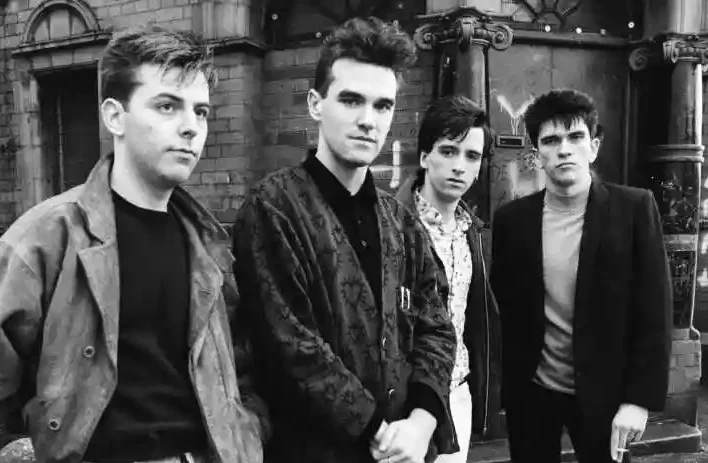No one combines musical duality quite like The Smiths. Their unique ability to fuse somber, introspective lyrics with upbeat, jangly melodies has defined their sound, creating a contrast that both intrigues and resonates. Even in “There Is A Light That Never Goes Out,” a celebrated British anthem, the longing for an eternal connection with a loved one is set against a deceptively lively backdrop.
The band, driven by Morrissey’s haunting lyrics and Johnny Marr’s innovative guitar work, explored themes of alienation, heartache, and self-reflection. Morrissey’s words delve into the complexities of unrequited love, existential musings, and life’s hardships. Yet, the real allure of The Smiths lies in their ability to cloak these heavy themes within catchy hooks and vibrant rhythms, allowing listeners to feel both uplifted and introspective.
Take “This Charming Man” as a prime example. The track’s infectious rhythm might suggest a joyful love song, but Morrissey’s lyrics reveal frustration and unmet desire, creating a profound contrast with the lively beat. This blending of Marr’s buoyant compositions with Morrissey’s introspective and often somber reflections has become one of the band’s trademarks, as seen again in “Heaven Knows I’m Miserable Now.”
Here, Marr’s upbeat guitar contrasts sharply with Morrissey’s lamentations on unfulfilled dreams and disillusionment, drawing fans into an ironic dance between joy and melancholy.
The Smiths’ talent for juxtaposition is further highlighted in tracks like “How Soon Is Now?” and “Please, Please, Please, Let Me Get What I Want.” In these songs, Marr’s intricate guitar work forms an expansive soundscape that feels paradoxical when paired with Morrissey’s lyrics of yearning and despair, creating a unique emotional depth that transcends generations.
Despite their knack for contrast, The Smiths’ catalog isn’t all lively tunes wrapped around darker themes. Several tracks lay bare raw emotions, tugging at the heartstrings in a way that’s unmistakably sorrowful. Take “I Know It’s Over” from The Queen Is Dead album. Here, Morrissey’s soulful vocals blend with Marr’s gentle guitar to craft a heartbreaking atmosphere as he sings of desolation after a relationship’s end. The song captures the agony of heartbreak with a haunting clarity.
Similarly, “Last Night I Dreamt That Somebody Loved Me” delves into themes of unrequited love and emotional vulnerability. Marr’s evocative guitar layers beneath Morrissey’s lyrics, embodying the deep ache of unreturned affection. And with tracks like “Asleep,” known for its meditations on death and depression, the band further solidifies its reputation for heart-wrenching honesty.
The beauty of The Smiths’ saddest songs lies in how Marr’s melodies intensify Morrissey’s sorrowful narratives. Fans often debate which of their songs is the most somber: “I Know It’s Over,” “Suffer Little Children,” “Well I Wonder,” “Meat Is Murder,” and “That Joke Isn’t Funny Anymore” are just a few contenders. While opinions vary, one thing is certain, as both fans and critics agree: The Smiths are masters of melancholy, weaving sadness into music that remains iconic and deeply affecting.








